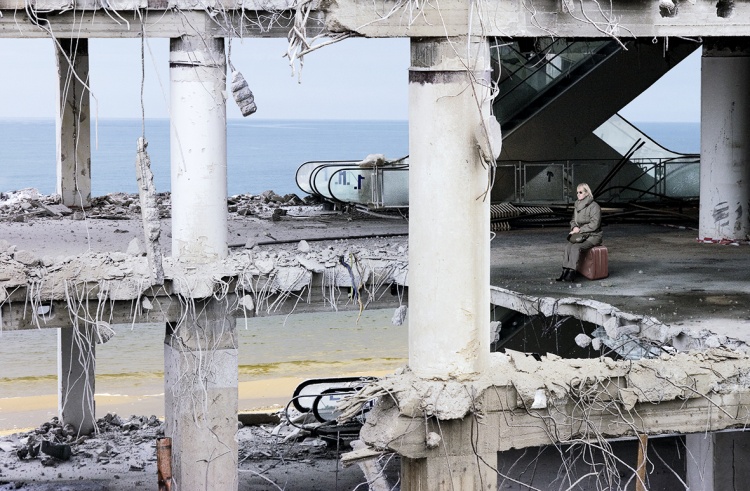With the 21st Conference of the Parties taking place at the end of this year, the United Nations climate process is heading towards another climax. The aim is nothing less than the adoption of an international legally binding agreement limiting atmospheric warming to a maximum of 2 degrees. This appears questionable, however, given the diverging positions of states seen at the latest climate negotiations in Lima at the end of 2014. Meanwhile, current trends all point towards a failing of the 2 degree aim. As so often in international negotiations, there is a formidable gap between knowledge and action: although the global risk of climate change impacts is acknowledged internationally, current measures are insufficient. The debate centres on the question of how to share the burden of climate change equitably. Which countries and actors bear the main responsibility and, on this basis, have to make what contribution? Can there actually be climate justice?
Different concepts of responsibility and (climate-) justice provide different answers to this question. One idea of justice is based on historical emissions. Following the polluter pays principle, this concept stipulates higher shares for countries who contributed more to climate change in the past by emitting higher amounts of CO2. The current economic situation of states provides a second benchmark for climate justice: economically stronger countries should bear a higher share of the burden of climate change. This type of burden sharing takes into account that many of the countries most affected by climate change are economically weak. Priority is given to the support of the most vulnerable countries. A third type of attributing responsibility is based on the allocation of CO2 budgets. First, the global amount of CO2 is determined which can be emitted within the limits of the 2 degree goal. This “budget” is then distributed worldwide among all citizens according to the principle "one human – one emissions right". There are then two alternatives: either the allocation of national budgets on the basis of these per-capita emissions allowances in sum, or the allocation of individual carbon budgets. In neither case are the historical emissions taken into account. However, the pressure to act is still given, considering that states with current high emissions would use up their budgets in only a few years. The individual approach that operates independently of nation states is politically more explosive though: it would extremely restrict the lifestyles of many, particularly amongst the global elites. This would, however, ensure much greater equity across individuals. Elites who lead a fairly expansive lifestyle would receive CO2 budgets as large as the poorest of the poor and would be forced to a radical rethink. Next to the distribution of greenhouse gas budgets, the issue of their tradability is yet another point of contention in the debate (for the different approaches, see i.a. Birnbacher 2010; Duncan 2011; Klimabündnis Forschungsinstitut 2012; Narain 2007; WBGU 2008).
This brief review of three concepts reveals the complexity of the notion of climate justice where ethical, practical and of course political considerations play a role. The success of climate politics in industrialized countries ought to be viewed with some scepticism: although CO2 emissions have mostly decreased here over the last years, the reduction was relatively slow. Between 1990 and 2013 the EU registered an emission reduction of 14 % while US emissions actually increased by 6%. Since 2010 even the supposed "role model" Germany witnessed increasing CO2 emission rates despite the rapid development of renewables (BMWi 2014; PBL 2014; see graph 1).
 Graph 1: CO₂ Emissions of the five main emitters and the EU. Source: PBL 2014: 14
Graph 1: CO₂ Emissions of the five main emitters and the EU. Source: PBL 2014: 14
The development of emissions in emerging economies is another explosive topic, as India and China are increasingly turning into big emitters. Regardless of any equity considerations, it is clear that climate change cannot be stopped without a turnaround of their energy- and resource policies: even a complete removal of all European and US-emissions would be insufficient to reach the 2 degree target (see graphs 1f in Tavoni et al. 2015). This illustrates the current dilemma: these countries urgently need to move towards more climate-friendly politics; whilst according to the principle of polluter liability, they bear only little responsibility for climate change. Sharing the burden according to current economic strength also places the main responsibility for the fight against climate change with the more developed economies – even more so when based on per-capita distribution of income and emissions.
 Graph 2: Emissions-Budgets per region, Source: Tavoni et al. 2015
Graph 2: Emissions-Budgets per region, Source: Tavoni et al. 2015
Faced with this dilemma between historical and future responsibility, the international community has agreed on a compromise: the financial support of emerging economies by industrialized countries. To this effect, institutions such as the Green Climate Fund were established in order to support emerging and developing economies in mitigating CO2 emissions and adapting to climate change. As a result, the debate about equity has increasingly become a financial issue.
At the same time, the responsibility of the industrialized countries must not be obscured by the focus on the emissions of emerging economies. Current levels of material prosperity and industrialization were only reached through an expansive and exploitative economic system without respect for planetary boundaries. Moreover, the US and the EU still rank second and third behind China in CO2 emissions. In per-capita figures China and India with 7,4 and 1,7 tons per capita/year still rank far behind the US and also Germany, where citizens on average emit 16,6, respectively 10,2 tons of CO2 per year (PBL 2014: 49). These figures provide additional reasons for highlighting industrialized countries' special responsibility. With this in mind, the financial support of other countries in their mitigation and adaptation efforts is necessary but not sufficient. Rather, the countries of the Global North have to impose much more far-reaching climate goals on themselves – which can only be achieved by fundamental change.
While the international community is preparing for its next climate summit in Paris, the Degrowth in Action – Climate Justice Summer School 2015 will shed light on new solutions and approaches. Regardless of whether Paris will lead to results or not, the concept of global climate justice requires the extensive social-ecological transformation of the economies and societies in the Global North. Turning away from the current profit-driven economy which relies on continuous growth is inevitable. Degrowth – not understood as mere reduction of economic growth but as radical transformation of society – offers promising and comprehensive approaches here. The summer school will discuss the connections between climate justice and degrowth and develop concepts on how societies and economies can be designed beyond the logic of economic growth.
With this, the summer school will take up the impulses of the Leipzig Degrowth Conference where more than 3000 people came together to think and discuss such alternatives (see panel „Climate justice and post-growth“, workshop „Climate justice and degrowth: commonalities, resistances and alternatives“ and the special session on „Post-extractivism and de-growth: Two sides of the same perspective?“). This year's debate will take place in an area of concrete political struggle: in the midst of the Rhineland lignite-mining area; the biggest source of CO2 emissions in Europe. Besides keynotes and panels, there will be courses spanning several days providing in-depth analyses of a variety of topics around alternative economic systems and climate justice. In addition there will be opportunities to develop concrete approaches for applying the concept of degrowth on the political level. The myth of "green growth" will be discussed alongside the connection between climate change, war and migration; not to forget practical alternatives for mobility, work or global trade in a post-growth society. The summer school will also be a place where we can actually start applying these approaches in practice. In cooperation with the climate camp, the summer school will offer learning spaces in workshops, World Cafés and the opportunity to participate in the organization of the camp. Furthermore, at the summer school as well as the climate camp there will be a bunch of cultural events creatively exploring critical questions.
What's more, there will be events on climate justice and degrowth beyond the summer school in the Rhineland. In June there will be a speakers tour on the topic of phasing out coal, post- growth and climate justice in various German cities organized by attac, the Rosa Luxemburg-Foundation and the think tank "Konzeptwerk neue Ökonomie". And, last but not least, another summer school taking place in Barcelona will focus on "Degrowth and environmental justice" (6-15 June). The degrowth website and our blog are following the debates (see the latest aricles by Tadzio Müller and Janna Aljets) paving the way to the summer school.
------------------- Translation: Christiane Kliemann and Luke Haywood
References Birnbacher, Dieter (2010). "Climate responsibility as a distributional issue", Analyse & Kritik 1: 25-37. Clark, Duncan (2011). "Which nations are most responsible for climate change?", The Guardian. http://www.theguardian.com/environment/2011/apr/21/countries-responsible-climate-change [5.2.2015]. Klimabündnis Forschungsinstitiut (2012). Das Dilemma mit der Klimagerechtigkeit. http://issuu.com/klimabuendnis/docs/dilemma_klimagerechtigkeit_2012/0 [31.3.2015]. Narain, Sunita (2007). "A ‘just’ climate agreement: the framework for an effective global deal". In: Schellnhuber, H. J., M. Molina, N. Stern, V. Huber and S. Kadner (eds.) Global Sustainability – A Nobel Cause. Cambridge University Press: Cambridge (UK) and New York (USA), 107-121. PBL Netherlands Environmental Assessment Agency (2014). Trends in global CO₂ emissions: 2014 Report. http://www.pbl.nl/en/publications/trends-in-global-co2-emissions-2014-report [31.3.2015]. Tavoni, Massimo; Kriegler, Elmar; Riahi, Keywan; van Vuuren, Detlef P.; Aboumahboub, Tino; Bowen, Alex; Calvin, Katherine; Campiglio, Emanuele; Kober, Tom; Jewell, Jessica; Luderer, Gunnar; Marangoni, Giacomo; McCollum, David; van Sluisveld, Mariësse; Zimmer, Anne & Bob van der Zwaan et al. (2015). "Post-2020 climate agreements in the major economies assessed in the light of global models", Nature Climate Change 5: 119-126. Wissenschaftlicher Beirat der Bundesregierung Global Umweltveränderungen (WBGU) (2009). Kassensturz für den Weltklimavertrag – Der Budgetansatz. Sondergutachten. www.bmbf.de/pubRD/wbgu_sn2009.pdf [28.3.2015].
Degrowth poses a fundamental challenge to a Labour Party that has yet to decide how far it wishes to transcend – and not merely reform – a growth- oriented, capitalist political economy. The British Labour Party has seen a resurgence of radicalism since the 2007-8 financial crash. With the collapse of the authority of neoliberalism, a space has opened for alternative ideologies, theories and...

Why a social-ecological transformation is impossible without changing the deep structures of our economy Opening a newspaper or listening to the radio news exposes us to a flood of catastrophic messages: devastating droughts, failing states, terrorist attacks, and financial crashes. You can look at all those incidents as unconnected singular phenomena, which is exactly what the common presenta...
Before an individual chooses to act, he or she requires a story or mindset to make sense of what the situation is about. Acting rationally in this sense means to act with reason, in congruence with one’s worldview and the individual interpretation of the “rules of the game.” Individual mindsets, however, are not fixed [...]